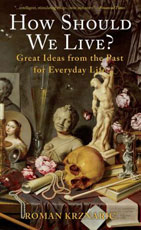"[Helen] Keller listened to classical music through its vibrations and could tell the age and sex of strangers through the resonance of their walk on the floorboards. One day, when wandering through a favourite wood, she felt an unexpected rush of air coming from one side, and knew that nearby trees she loved must have been recently felled. She could recognise all her friends instantly by their smell. She even claimed to comprehend colour through the power of analogy: 'I understand how scarlet can differ from crimson because I know that the smell of an orange is not the smell of a grape-fruit.' Yet she recognised the limits of her knowledge, for she could never sense a room or a sculpture in its entirety, and was always piecing together the small portions of the world her fingers could touch at anyone moment.
"What is Helen Keller's message for the art of living? 'I have walked with people whose eyes are full of light, but who see nothing in wood, sea, or sky, nothing in city streets, nothing in books. What a witless masquerade is this seeing! . . . When they look at things, they put their hands in their pockets. No doubt that is one reason why their knowledge is often so vague, inaccurate, and useless.' Our task, it seems, is to take our hands out of our pockets, and cultivate all our senses. That is how we might both nourish our minds and, ultimately, deepen our experience of life.
The senses can be a challenging dimension of everyday life. Some people feel they are victims of sensory assault — a constant bombardment of images and cacophonous noise compels them to seek calm and silence, to tune out of their senses. Others lead such busy lives that they have no time to appreciate the sensory universe. Yet if we had Helen Keller as a constant companion throughout each day, we would surely recognise that the senses are a gift, and be encouraged to make cultivating them a personal priority. How should we go about tuning in rather than tuning out?
"We might each think of ourselves as sensory travellers, embarking on tours of our local landscape to discover its hidden depths and beauties. Could you create a sensory itinerary for exploring your neighbourhood, or even your own home? Or we might simply decide to focus our awareness on the smell and texture of the food we eat each evening, looking for exactly the right words to describe our culinary experiences. What does the skin of a ripe plum smell like, and what does it feel like in our mouths? We might equally endeavour to hone our nontraditional senses, for instance by doing yoga or the Alexander Technique to develop our kinaesthetic sense of bodily movement and balance.
"The senses are one of the most precious ways we have to learn about the world, and about ourselves. Most of us have hardly begun to harness their latent power. Turning on our senses is a forgotten freedom we all possess, and can add new dimensions of meaning and experience to our lives. It is time we opened ourselves to all the delights, surprises, curiosities and memories that lie in wait for us."
